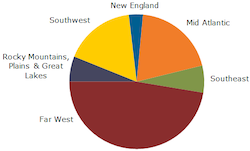According to a new report by NPD Solarbuzz, solar photovoltaic (PV) installations in the U.S. have broken through the 10 gigawatt (GW) barrier. During the first half of 2013, more than 1.8 GW of new solar PV capacity was installed according to the North America PV Market Quarterly report.
 “The U.S. has now joined an elite group of maturing solar PV markets that have accumulated more than 10 GW of installed capacity,” commented Christopher Sunsong, analyst at NPD Solarbuzz. “Only Germany, Italy, and China have more installed PV capacity than the US. The US is only the fourth country to reach the 10 GW milestone of installed PV capacity.”
“The U.S. has now joined an elite group of maturing solar PV markets that have accumulated more than 10 GW of installed capacity,” commented Christopher Sunsong, analyst at NPD Solarbuzz. “Only Germany, Italy, and China have more installed PV capacity than the US. The US is only the fourth country to reach the 10 GW milestone of installed PV capacity.”
Solar PV has been one of the fastest growing energy sources in the U.S. over the past six years, with a compound annual growth rate of over 50 percent since 2007. Cumulative solar PV installations are forecast to increase an additional 80 percent over the next 18 months, surpassing 17 GW by the end of 2014 says the report.
NPD SolarBuzz says the rapid uptake of solar PV in the U.S. is being driven by the dramatic solar system price declines observed since 2011. Average installed system prices have declined from around $6/watt two years ago to approximately $4.25/watt for residential installations and $3/watt for large utility-scale PV projects today.
“U.S. solar PV market growth has been stimulated by an increased range of solar incentive programs at the state level,” added Sunsong. “While the Far West and Mid-Atlantic states dominate the 10 GW installed, the Southwest and Southeast regions have recently made strong contributions. Other regions however, such as the Great Plains and Great Lakes, remain largely undeveloped, creating further market upside going forward.”
The report also finds that solar PV installations in the U.S. have seen significant growth since the start of 2010; 83 percent of the 10 GW were completed within the past 14 quarters. Almost 1,400 solar PV installations in excess of 500 kW in 39 different states are providing 5.4 GW of capacity, and nearly 40 percent of that capacity is within California.









